月神: Xiaoyao said to her father, “I know it’s difficult, but I don’t want to be deceived.” When watching the drama, this part was one of the turning points, and my inner monologue was: What? Who deceived you? Why deceive you? Surely not Yiyinghou. Was it the fox deceiving you? Weren’t you acting out a deep and inseparable love with him? This word “deceive” once again left my mind in a complete mess.
有匪君子: I think the foreshadowing lies in those years when she was studying medicine.
At first, she was only a half-trained physician, only able to treat infertility, and she wasn’t attentive or thoughtful about the matter of the fox. After waking up 37 years later, she was still absent-minded and didn’t realize it at that time.
Later, after she seriously studied medicine, she discovered through pulse diagnosis that something was wrong, and then she recalled that the fox’s family affairs were even more suspicious. At this point, she brought it up with the King of Haoling, saying she had been deceived and wanted the truth.
Weren’t you helping me seize the fox? Then help me investigate. In the original novel, she kept pressing her grandfather with questions, and it was written in an obscure way, whereas the drama clarified many of those extremely hidden points.
元宝是个宝:Right, “I don’t want to be deceived”? Watching the drama, I was really confused. What we know: Fangfeng Yiying is Tushan Jing’s legitimate fiancée, his proper wife. Xiaoyao and Tushan Jing, from beginning to end, were always in a hidden relationship, never seen in the light. And Yiying for a long time even thought Xiaoyao was his second brother’s girlfriend. Fangfeng Yiying had an affair with Hou; if we are to talk about deception, at most it was deceiving Tushan Jing. To say Xiaoyao was deceived by Yiying and Hou doesn’t hold up under scrutiny—logically, it doesn’t make sense.
So on closer thought, the deception behind it can only be: why did Tushan Jing, after getting married, still insist on holding onto me and refusing to let go—even providing supplies to Xiangliu, at the cost of damaging his relationship with Fenglong, just to take me back? What secret was he hiding? After so many years, was his heart truly genuine, or were there other motives? I want to know the truth!
Isn’t this much more clearly in line with the idea of words carrying a hidden meaning?
Why did Tong Hua say that Lost You Forever is her most mature work in terms of writing technique? Is it really just as it appears on the surface? Was it done intentionally, or did she simply mess it up?
So mature that 99.9% of people can’t see the hidden threads.
So mature that you think she is writing about one person, but in fact she is writing about two.
So mature that she weaves into the story hundreds of poems, countless allusions, historical figures, the Classic of Mountains and Seas background, and traditional Chinese culture— all seamlessly integrated.
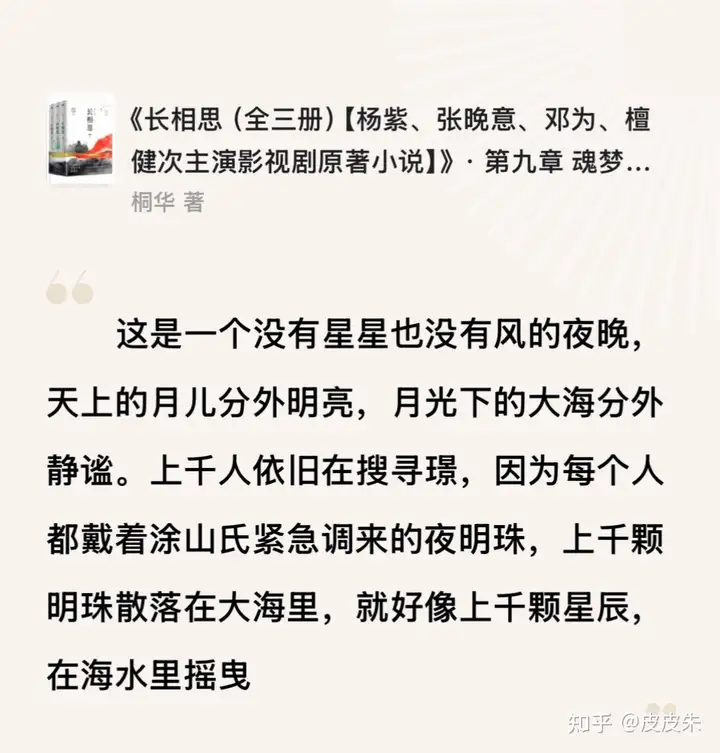
For example, in the original novel, during the sea rescue of Tushan Jing, the author described a beautiful scene—the bright moon over the sea, with thousands of luminous pearls swaying in the water, like countless stars.
This is precisely the famous line: “In the vast sea, the bright moon shines, and the pearls weep with tears.”
Moreover, “锦瑟 (Jinse / The Brocade Zither)” also corresponds to Tushan Jing’s character setting of being highly skilled at the 琴 (qin / Chinese zither). And 锦瑟 (Jinse) is a poem that personifies someone—it was written for 青衣 (Qingyi), a maidservant of 令狐楚 (Linghu Chu)’s household.
The 狐 (fox) corresponds to the 九尾狐 (nine-tailed fox), the 婢女 (maidservant) corresponds to Tushan Jing once having been in the role of 叶十七 (Ye Shiqi)’s servant, and 青衣 (Qingyi) corresponds to Tushan Jing’s fondness for wearing green robes.
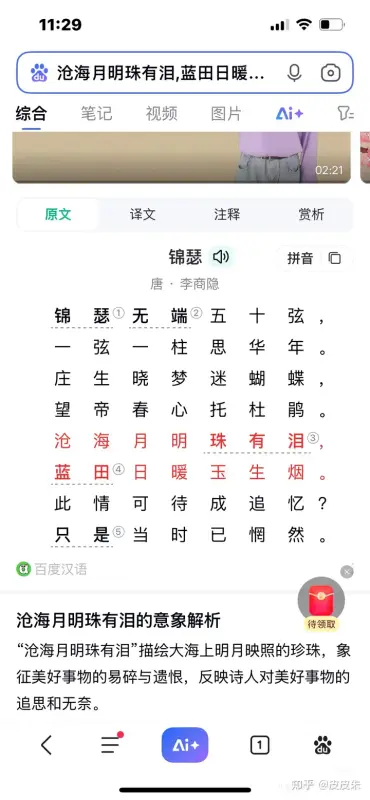
[《锦瑟》 Jinse
Li Shangyin (唐 · 李商隐)
锦瑟无端五十弦,
jǐn sè wú duān wǔ shí xián,
The brocade zither, for no reason, has fifty strings,
一弦一柱思华年。
yī xián yī zhù sī huá nián.
Each string, each bridge recalls the splendid years.
庄生晓梦迷蝴蝶,
zhuāng shēng xiǎo mèng mí hú dié,
Zhuang Zhou at dawn, lost in a dream of butterflies,
望帝春心托杜鹃。
wàng dì chūn xīn tuō dù juān.
Emperor Wang entrusted his springtime longing to the cuckoo.
沧海月明珠有泪,
cāng hǎi yuè míng zhū yǒu lèi,
In the vast sea, the bright moon shines, and the pearls weep with tears,
蓝田日暖玉生烟。
lán tián rì nuǎn yù shēng yān.
At Blue Fields, warmed by the sun, jade gives off mist.
此情可待成追忆,
cǐ qíng kě dài chéng zhuī yì,
This love could have become a memory to cherish,
只是当时已惘然。
zhǐ shì dāng shí yǐ wǎng rán.
Yet at the time, it was already filled with regret.]
“Zhuang Zhou dreamt of being a butterfly, confused at dawn; Emperor Wang entrusted his springtime longing to the cuckoo” corresponds to Tushan Jing, who longed for Xiaoyao but could never truly have her.
The imagery of butterflies flying in pairs belongs to Xiaoyao and Xiangliu; Tushan Jing could only think of it in dreams. Such a beautiful vision could only be realized by others, not him.
Therefore, the Tushan Jing who returned was no longer the real Tushan Jing.
The ending also matches the poetic verdict: “This love could have become a memory to cherish, yet at the time it was already filled with regret.”
Together with the shattering of 鱼丹紫 (Yu Danzi) and the jade bracelet left unfinished (signifying no destined bond), it shows that Tushan Jing had indeed already died in that assassination attempt.
Cr.皮皮朱
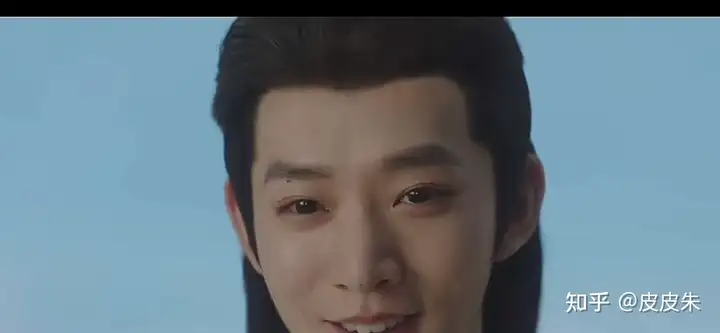
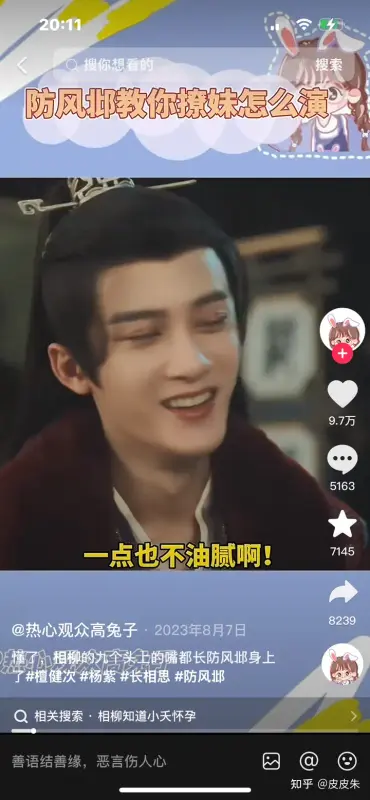 The Tushan Jing who returned from Yushan = the Fangfeng Bei who returned from the far northern lands, dressed in clothing similar to Fangfeng Bei’s, with deliberately made eye bags (wochan) like Fangfeng Bei’s.
The Tushan Jing who returned from Yushan = the Fangfeng Bei who returned from the far northern lands, dressed in clothing similar to Fangfeng Bei’s, with deliberately made eye bags (wochan) like Fangfeng Bei’s.
'real' tushanjing ⬇️
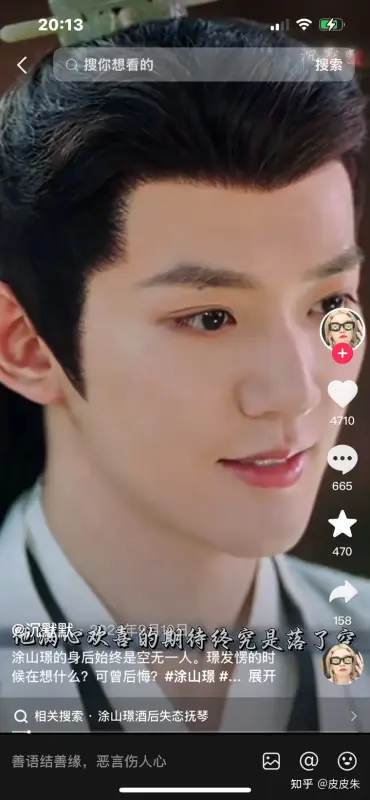
On Tushan Jing’s hair crown, a small octopus (Xiangliu’s original form) can be seen. The hairpin is an arrow, with the feathered tail resembling either the Fuxi–Nüwa pattern or a fluffy ball—an open mouth, two people embracing.
On the wedding robe, the central waist sash is patterned with rippling waves, while the hidden designs in the fabric show fish playing among lotus leaves and small fish.
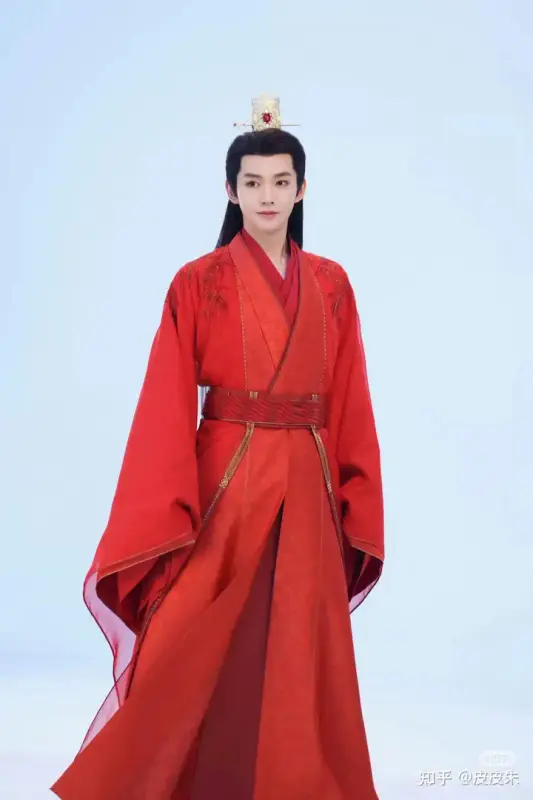 And it was deliberately mentioned: “Encountering the great whirlpool under the sea” .This clearly indicates that the one who returned was Xiangliu.
And it was deliberately mentioned: “Encountering the great whirlpool under the sea” .This clearly indicates that the one who returned was Xiangliu.
The great whirlpool under the sea—anyone who has read the original novel knows that Tushan Jing had absolutely no chance of surviving it. Last time, it was Hongjiang who rescued Xiangliu from the great whirlpool under the sea.
Official poster: My heartbeat recognized you first.
Without reading the original novel, one wouldn’t understand the significance of heartbeat for Xiaoyao and Xiangliu. As long as Xiaoyao’s heart races, suddenly pounds, thumps wildly… the one before her is Xiangliu, or Xiangliu is about to appear.
The candle flame represents life. This was explained in the original novel, in the chapter of the 37 years under the sea.
So, in the drama, and also the extra letters from the four men to Xiaoyao,please,watch the candle flame.
The Xingxing Mirror reflects the past according to its owner’s heart. Xingxing (狌狌) is a play on xingxing (惺惺), as in xingxing xiangxi (惺惺相惜) — kindred spirits, those with shared character and aspirations.
In the drama, Xiaoyao and Xiangliu say:
“Why is it so hard to find someone who can walk the same path?”
“It is hard to find someone with shared interests, someone who truly keeps you in their heart.”
“In the end, we are not people who can walk the same path.”
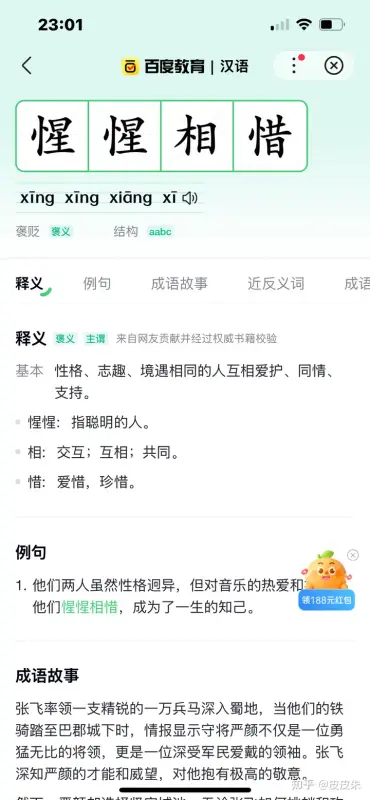
[Xīng xīng xiāng xì (惺惺相惜)
Definition:
People with similar character, interests, or circumstances cherish, sympathize with, and support each other.
惺惺: refers to intelligent or insightful people.
相: mutual, reciprocal.
惜: to value, to cherish.
Example sentence:
Although the two of them had very different personalities, their shared love of music made them cherish each other as kindred spirits and lifelong confidants.
Idiom story:
When Zhang Fei led a crack force of ten thousand troops deep into Shu territory, as their cavalry reached the gates of Ba Commandery, intelligence reported that the defending general, Yan Yan, was not only extraordinarily brave but also a leader deeply loved by both soldiers and civilians. Zhang Fei fully recognized Yan Yan’s talent and prestige and held him in the highest regard…
That’s right, the place Tushan Jing chose for the duel in Qingshui Town is called “White Tiger Biting the Corpse” in Feng Shui.
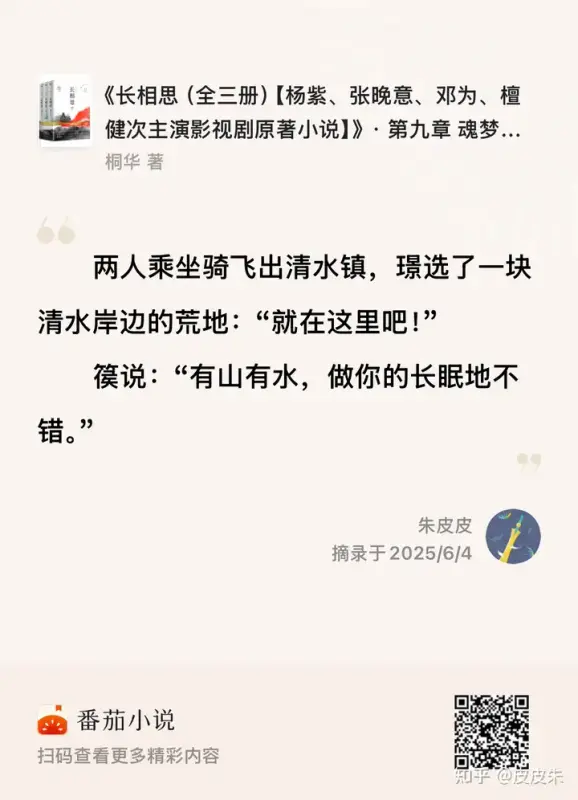
[The two rode their mounts and flew out of Qingshui Town. Jing chose a deserted piece of land by the Qingshui riverside: “Let’s do it here!”
“Wrong.” Hou said, “With mountains and water—such a place should not become your resting ground for eternity.”]
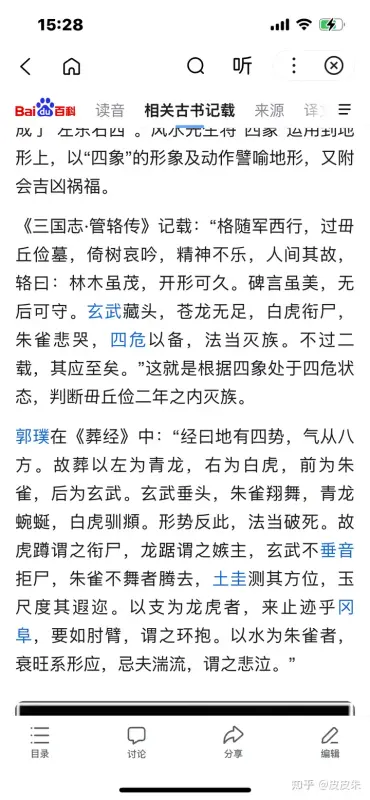
[Fengshui masters often apply terrain features to the imagery of the Four Symbols (Azure Dragon, White Tiger, Vermilion Bird, Black Tortoise), using their forms and movements as metaphors for the landforms, and linking them to fortune or misfortune.
The Records of the Three Kingdoms · Biography of Guan Lu records:
“When Guan Lu accompanied the army marching west and passed the tomb of Muqiu Jian, he leaned against a tree and chanted mournfully, his spirit unhappy. When people asked the reason, Lu said: ‘Although the forest is dense, its form cannot last long. Though the inscription on the stele is fine, there will be no descendants to guard it. The Black Tortoise hides its head, the Azure Dragon has no feet, the White Tiger bites a corpse, the Vermilion Bird cries in sorrow—this is the configuration of the Four Symbols in a state of peril. According to the laws, the clan must perish. Within two years, the omen will come to pass.’”
This was a judgment based on the Four Symbols being in a dangerous state, predicting that Muqiu Jian’s family would be wiped out within two years.
Guo Pu, in the Classic of Burial, wrote:
“The Classic says: the land has four forms, and qi comes from the eight directions. Thus in burial: to the left is the Azure Dragon, to the right is the White Tiger, in front is the Vermilion Bird, and behind is the Black Tortoise. The Black Tortoise lowers its head, the Vermilion Bird soars and dances, the Azure Dragon winds and coils, the White Tiger bows its head in submission. If the forms are reversed, then according to the law, destruction and death follow. Thus the crouching Tiger is called ‘biting the corpse,’ the squatting Dragon is called ‘envying the master,’ the Black Tortoise not lowering its head is called ‘rejecting the corpse,’ the Vermilion Bird not dancing means it will fly away. The tugui measures the directions, the jade ruler measures the distances. When ridges serve as Dragon and Tiger, they should come and stop at hills and slopes, wrapping around like arms, which is called ‘embracing.’ When water serves as the Vermilion Bird…”]
Tong Hua really is a top student.
What does Xiangliu mean to Tong Hua? Can Tong Hua walk out of Xiangliu?
皮皮朱
Reading carefully, one realizes that Xiangliu embodies facing death in order to find life, but not courting death. Xiangliu’s ending is actually complete—laying down his armor and spending a lifetime with the one he loves.
So why does Tong Hua still feel unresolved? What she cannot let go of is that the readers’ hearts do not resonate with hers—just like Xiaoyao in the mountains, with no one able to truly understand her words.
That is why, when the story was adapted into a drama, they filled in two parts of the nine parts of blankness left in the novel, and then added a "filter". If you still don’t understand,it means that in your heart you believe Xiangliu is nothing more than a beautiful, strong, yet tragic fool—a pathetic sucker.
But the real Xiangliu is someone who deeply values trust and loyalty, someone who dares to love and dares to hate, who knows how to take up and how to let go—a military commander, a strategist, and a master of political maneuvering.
If Xiaoyao had firmly chosen Xiangliu, would Xiangliu have kept one life to live for himself, for Xiaoyao?
Pipi Zhu
Both in the novel and in the drama, the outcome is the same: Tushan Jing truly died, and the one who survived was Xiangliu.
Xiangliu has the A heart as clear as glass, shining with seven colors. He could face death unflinchingly for Xiaoyao, but if he lived, it would be because he himself wanted to live, not merely for Xiaoyao.
He truly did want to live, and indeed, he survived.
Tong Hua : love has nothing to do with appearance. If someone loves you, they love your core. A person who truly loves you will fall in love with you no matter how you change, because your core remains the same.
Therefore, from this perspective, Filter (滤镜) is truly very Tong Hua!
People who are in love will fall for each other no matter what, regardless of identity. In Lost You Forever, someone said that Xiangliu loves Wen Xiaoliu, not Xiaoyao—doesn’t that slap in the face? Even if Xiaoyao had chosen Tushan Jing, Xiangliu would still understand Xiaoyao’s struggles and her true feelings. Likewise, Xiaoyao truly understands Xiangliu’s dilemma.
They are the ones whose hearts and souls are genuinely connected. It is only us, the audience, who doubt Xiaoyao for Xiangliu, thinking that Xiaoyao does not deserve Xiangliu’s wholehearted devotion. In fact, it is the audience and Xiangliu who are the ones without true mutual understanding!
In Lost You Forever, the hidden ending is actually that Xiaoyao and Xiangliu spend their lives hand in hand, sharing the ordinary joys of the human world. The covers of the three volumes of Lost You Forever form a single painting cut into three parts, each used on a volume’s cover, with the third volume’s cover occupying the center (C) position of the complete painting. This signifies that they truly wandered the world together with Xiangliu.
Xiaoyao and Xiangliu
Singing, bathing.
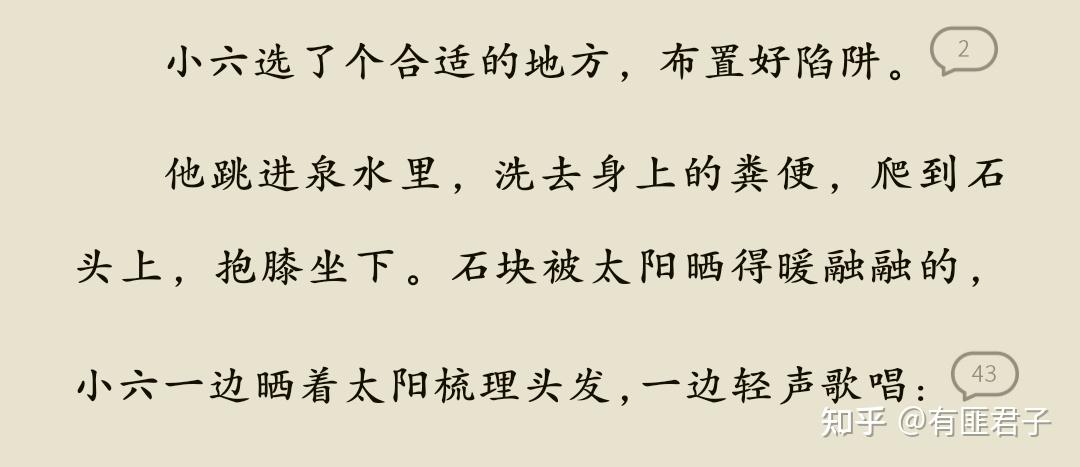
Xiao Liu “flirted” with Feifei, changing his appearance and voice.
[Xiaoliu chose a suitable spot and set up the trap.
He leapt into the spring, washed the filth off his body, then climbed onto a rock and sat hugging his knees. The stone had been warmed by the sun; as Xiaoliu basked in the sunlight, he combed his hair while softly singing.]
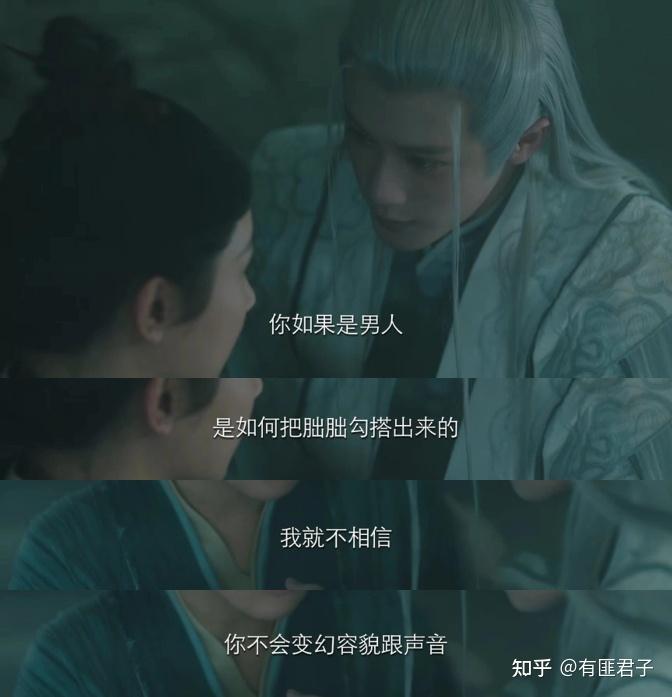 ⏫ Here lies the answer.
⏫ Here lies the answer.
Xiangliu saw the process in which Xiao Liu flirted with Feifei. Xiao Liu also admitted that when capturing Feifei, it was a woman’s body and voice.
What did Xiangliu see?
Perhaps it was the same as at the beginning when Xiao Liu saw Tushan Jing’s whole body—something the drama could not show, and even if filmed, could not be aired.
Xiao Liu jumped into the spring to bathe—what was the state?
No one knows; indeed, it was never mentioned.
...........
A brief interlude about Xiaoyao’s parents.
Chichen was being pursued by Yanqi and, on a cliff, saw A Heng.
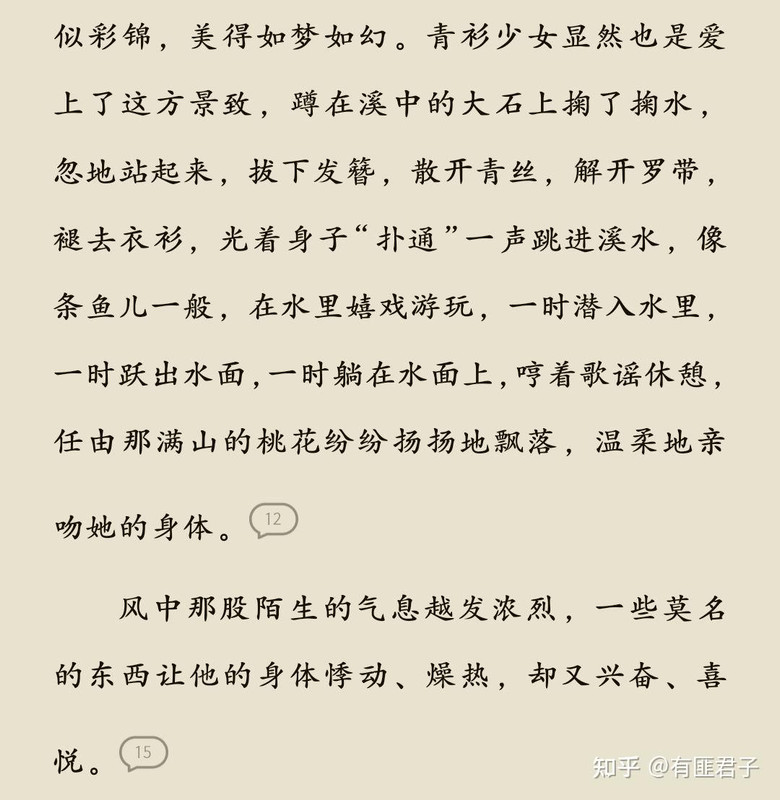
One was watching from the cliff, the other was playing in the water.
[The girl in the green robe had clearly fallen in love with the scene. She crouched on a large rock in the stream, scooped up some water, then suddenly stood up, pulled out her hairpin, let her dark hair fall loose, untied her silk sash, slipped off her clothes, and with a splash leapt naked into the stream. Like a fish, she frolicked and swam in the water—at times diving beneath the surface, at times leaping out, at times lying upon it, humming songs as she rested, while the peach blossoms from the mountains drifted down in profusion, gently kissing her body.
The strange scent in the wind grew stronger, and some inexplicable force made his body tremble, burn with heat, and yet also fill with excitement and joy.]
The beast’s body underwent certain changes—spring has arrived.
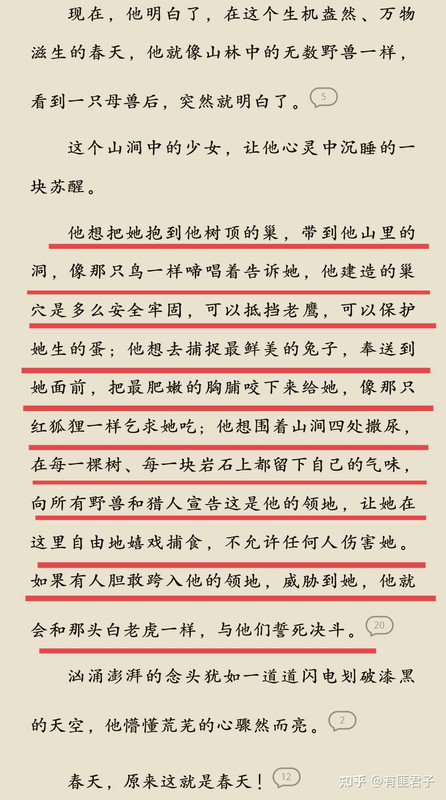
A part of his soul that had been asleep awakened.The parts marked with red lines are very mysterious.These things, Xiangliu also did later.
[Now he understood. In this spring of vibrant life, where all things flourish, he was just like the countless wild beasts in the mountains—after seeing a female beast, he suddenly realized.
The girl in this cave awakened a part of his soul that had long been asleep.
He wanted to carry her to his nest at the treetop, bring her into his cave in the mountains, and, like a bird, sing to her, telling her how safe and sturdy the nest he built was—able to withstand eagles, able to protect the eggs she would bear. He wanted to catch the freshest rabbit, present it before her, bite off the plumpest, tenderest meat from its breast and offer it to her, like the red fox begging her to eat. He wanted to urinate all around the mountain stream, leaving his scent on every tree and every rock, proclaiming to all beasts and hunters that this was his territory—so that she could frolic and hunt freely here, with no one allowed to harm her.
If anyone dared to step into his domain and threaten her, he would fight them to the death, like the white tiger.
These surging, overwhelming thoughts were like flashes of lightning tearing through a pitch-black sky, suddenly illuminating his once-ignorant, barren heart.
Spring—so this is what spring truly is!]
Xiangliu looked down from the cliff, listening to the mermaid’s mating-like song, as the wind stirred.
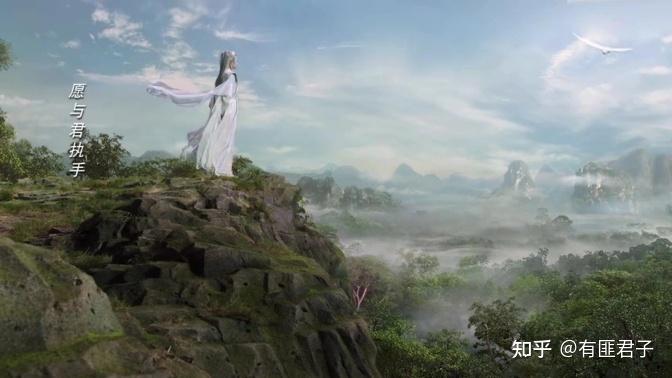
The wind blew against Xiangliu’s clothes.
This stunningly handsome male beast had gone into heat.
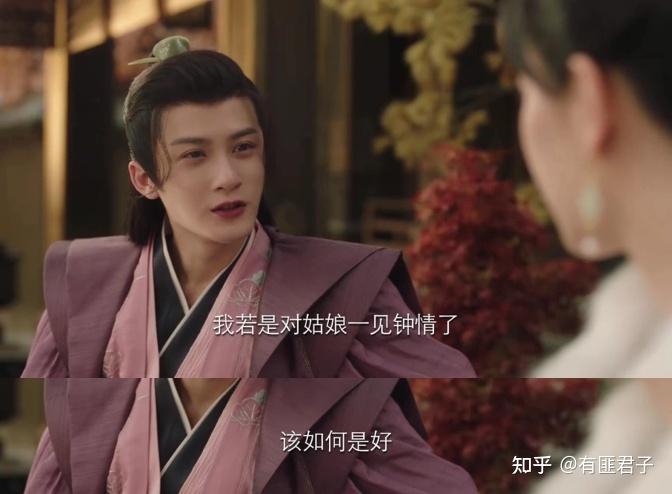
Animals are very straightforward; immediately afterward comes mating behavior.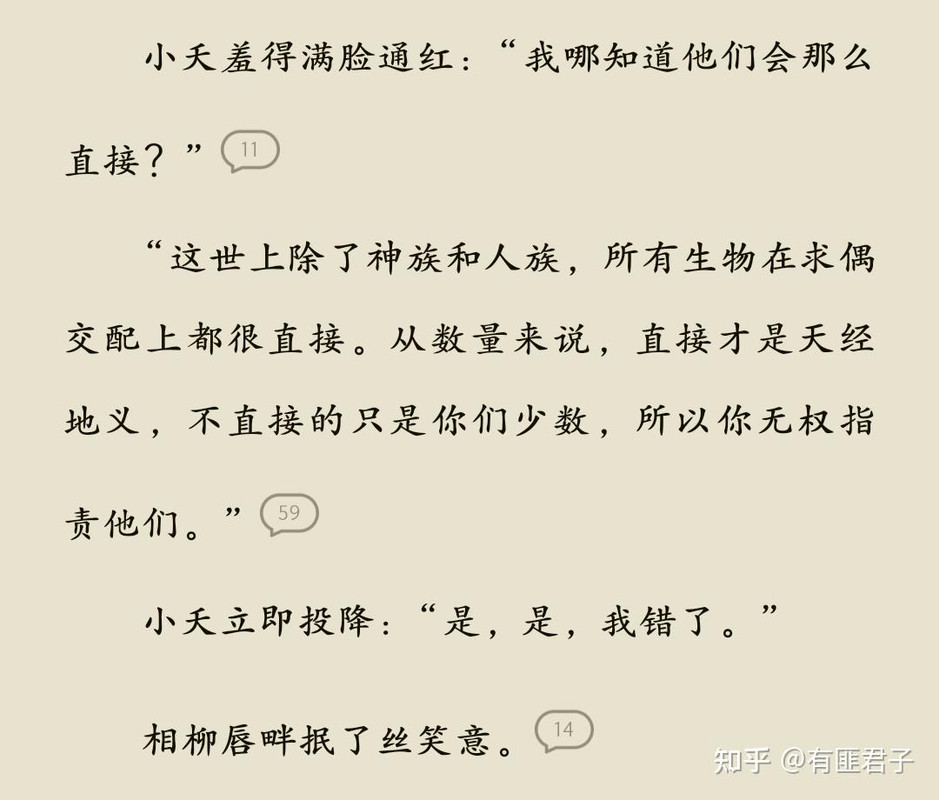
Very direct—if they want to “mate,” they find a way to do so.
[Xiaoliu blushed scarlet. “How was I supposed to know they would be so direct?”
“In this world, aside from the gods and humans, all creatures are very straightforward when it comes to courtship and mating. By sheer numbers, directness is what is natural and rightful; the indirect ones are only you few, so you have no right to criticize them.”
Xiaoliu immediately surrendered. “Yes, yes, I was wrong.”
A faint smile tugged at the corner of Xiangliu’s lips.]
With undetectable illusion techniques, superb poison skills, and suspicious signs, Xiangliu vaguely guessed Xiao Liu’s identity.
The subsequent mating and the “establishment of a water bond” had been dealt with earlier.
After the whipping, Xiangliu obtained a fairly satisfactory result: Xiao Liu said she would never leave Qingshui Town, even if it meant dying.
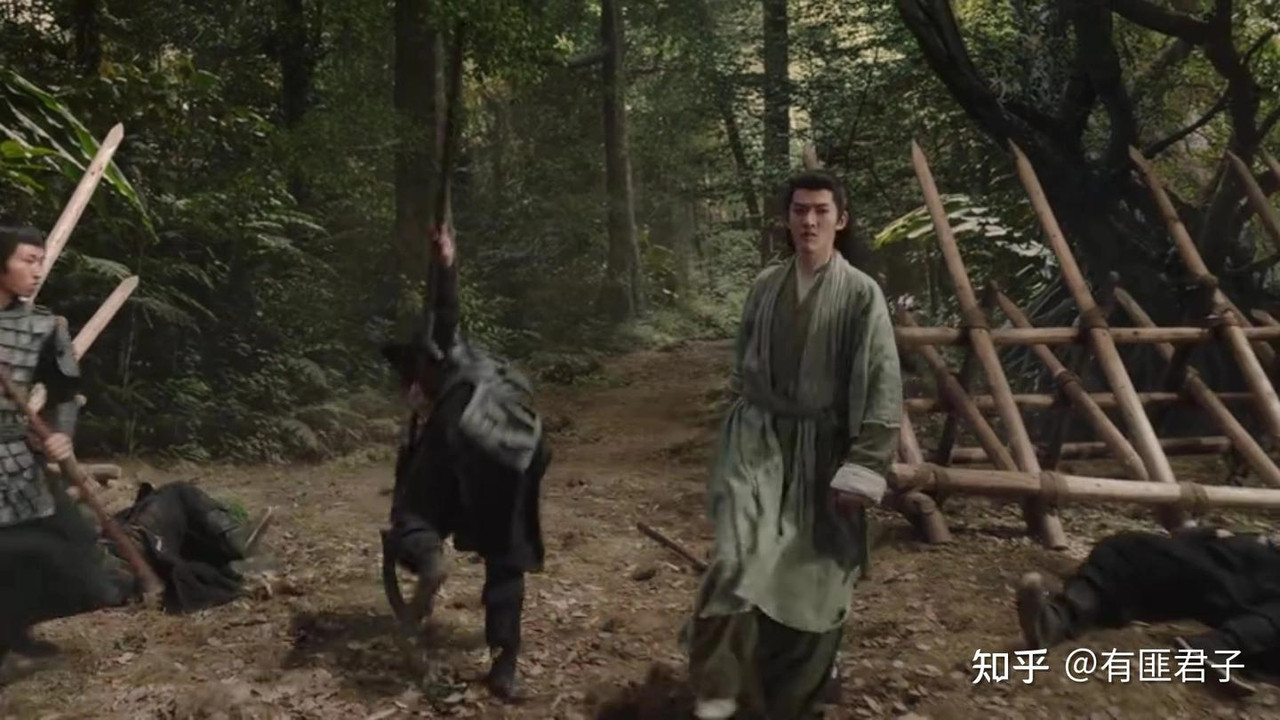
Afterward, Tushan Jing barged in.
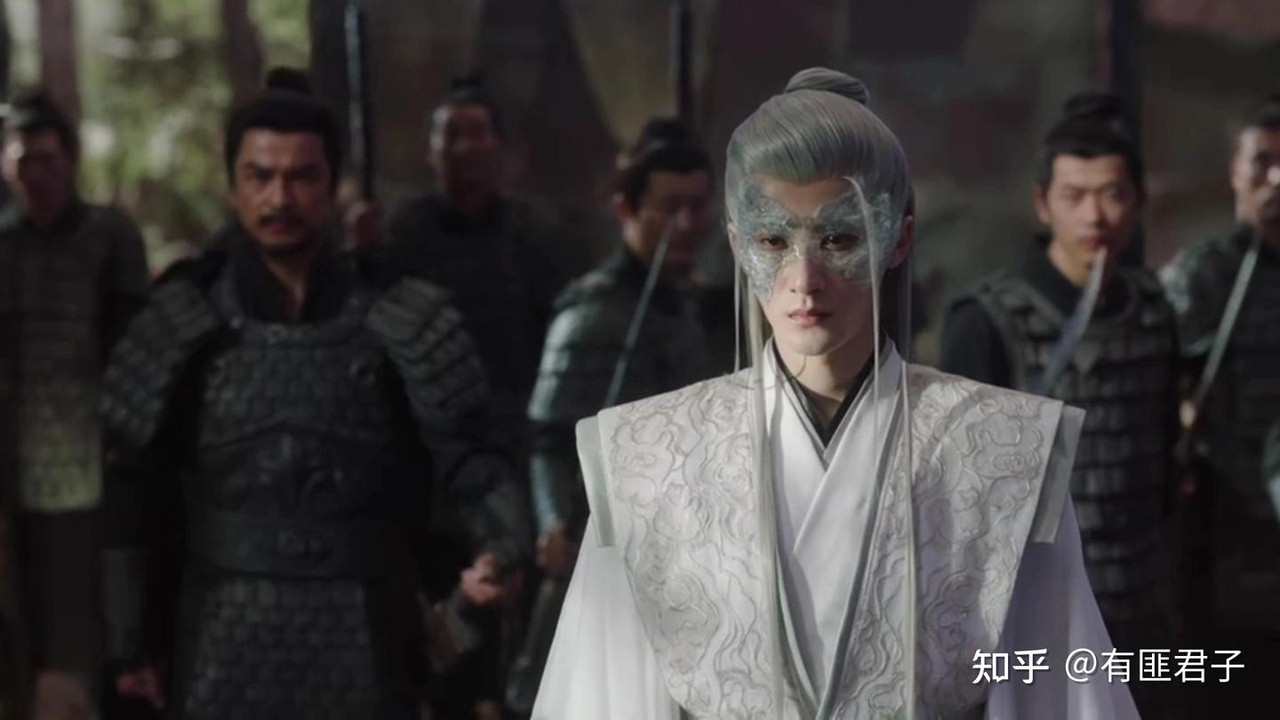
Seeing this, Xiangliu thought that this old acquaintance was being rather rude.
Tushan Jing and Xiao Liu, one after the other, made the same request to Xiangliu—“Help me keep my identity a secret.”
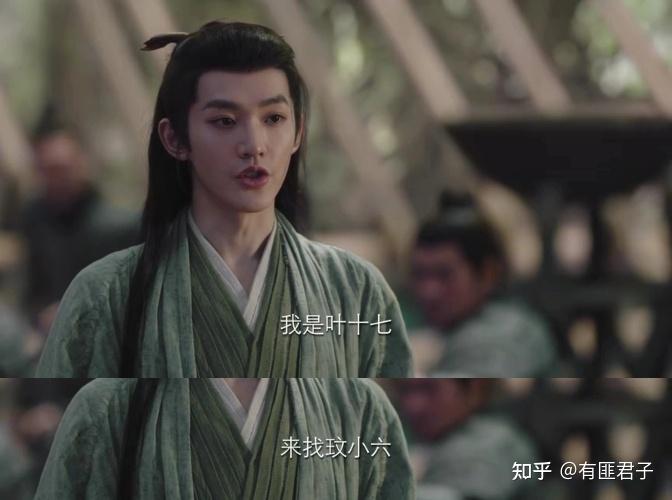
Upon meeting, Tushan Jing said: “I am Ye Shiqi. (Don’t call me the Young Master of Qingqiu in front of Wen Xiao Liu!)” He was concealing his noble identity.
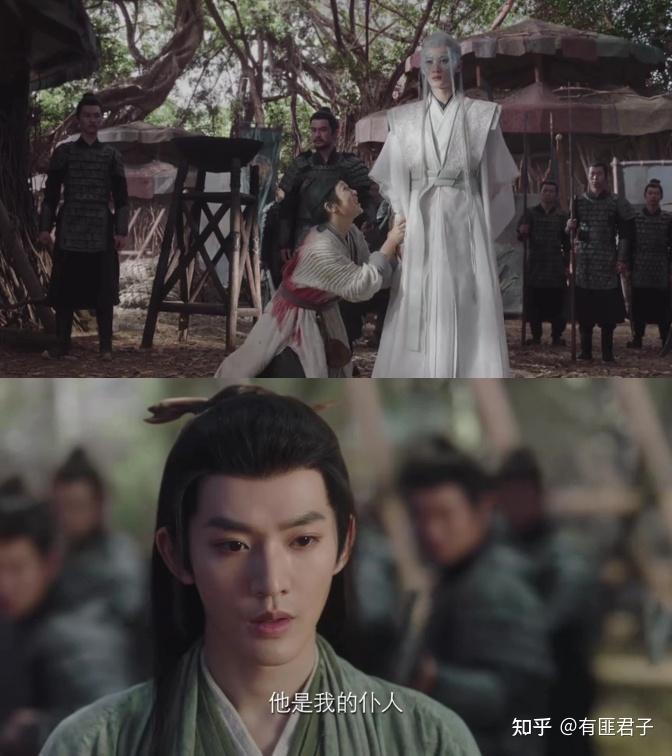
After being labeled a “servant,” Tushan Jing’s expression.
Xiao Liu, on one hand, explained to Xiangliu, “He is my servant,” while on the other hand, in front of Jing, praised Xiangliu’s “manly charm.”
Concealing both gender and romantic relationship.
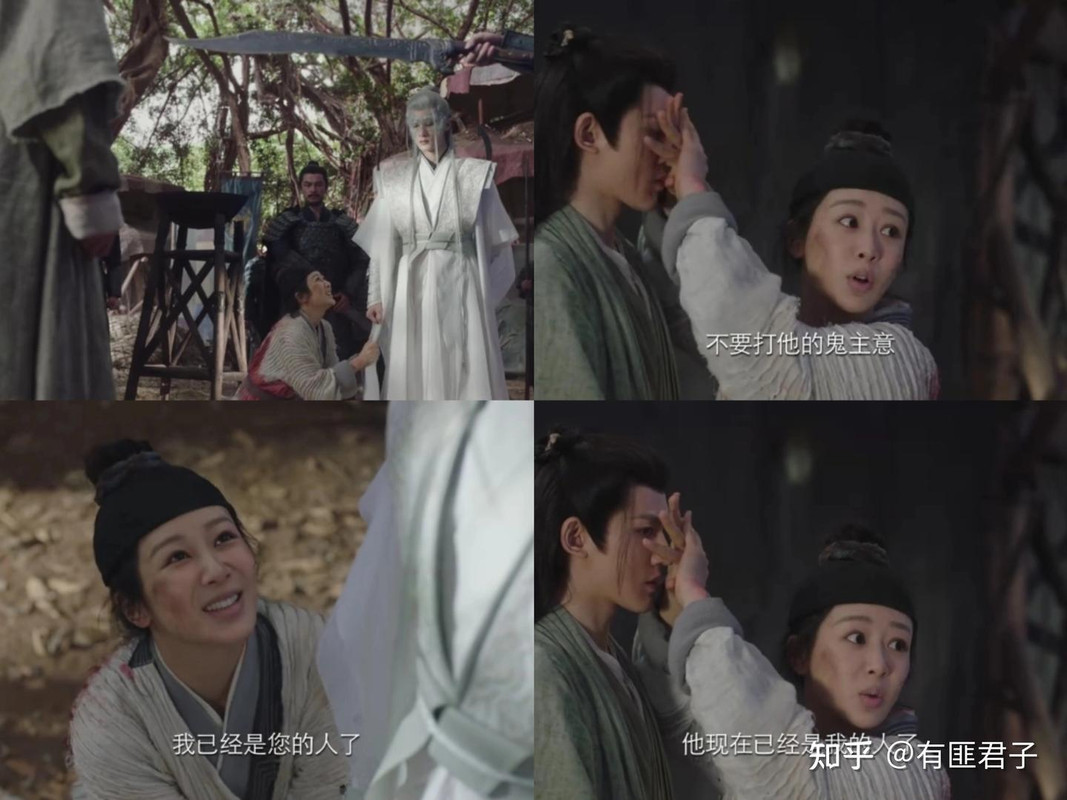
Xiangliu spoke in stiff “official language,” silently taking the blame for the “manly charm,” while simultaneously cooperating with the two in their performance.
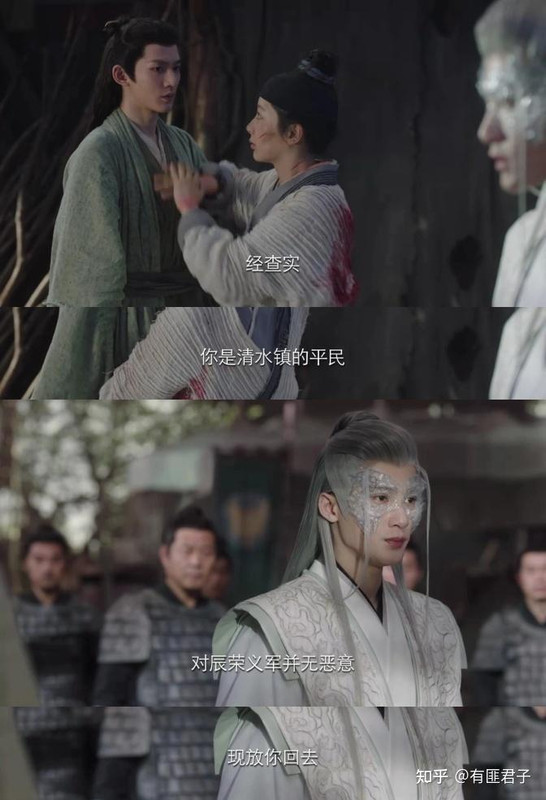
At this moment, Xiangliu saw Xiaoyao and Jing from a god’s-eye view.
Before him were two people: one he had just “cracked open the shell” of, established a bond with, and conquered by force; the other was an old acquaintance who had been in business for hundreds of years.
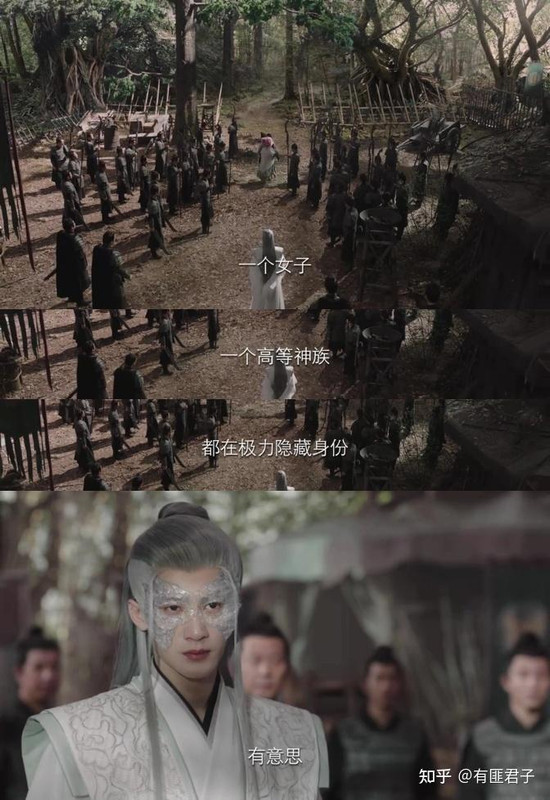
These two, seemingly close, were both trying hard to hide their identities from each other—interesting.
Xiangliu’s romantic history over hundreds of years of playing in the human world?
The number of girls he’s embraced must be countless.
.
He often took the girls out to eat.
.
But Fangfeng Bei was actually the godly young master he was pretending to be.
.
As an “animal,” Xiangliu—the truest version of himself—met, for the first time, a companion who entered his heart.
.
In the animal world, bonds were quickly formed.
(Plot)
Xiao Liu, disguised as a man, broke into a military restricted area, attempted poisoning, and was caught.
.
The most direct solution was to kill, just like this.
.
But no. The mating instinct of the beast, awakened by the song, made the course of events take an unnatural turn—Xiaoliu was not killed.
.
In this part of the story, it was Xiangliu’s first appearance. Out of his nine heads, three were used simultaneously to accomplish three things: examine Xiao Liu, assess her usefulness, and engage in animal mating behavior.
It was very complex, with many foreshadowing elements intertwined. To make it easier to understand, we will extract one thread and focus only on the mating part.
The first words upon bringing her back to the military camp:
.
“A good spy’s ears are sharper than their eyes.”
.
Xiaoliu explained that he was not a spy, but Xiangliu didn’t react.
.
As soon as Xiaoliu thought, “Does he want me to open my eyes?” he opened them, and Xiangliu took off his mask to reveal his face.
.
One revealed a handsome face, while the other stared blankly—using appearance to attract a female beast.
Xiaoyao had lived in the jungle for a hundred years and received the mating signal.
.
Facing the demon-eyed gaze, [he] directly expressed the needs of his soul: “Unable to protect myself, with no one to rely on, nowhere to go.” — Indicating a longing for strength, home, and freedom — I am willing.
.
(In the original work, it says here that the shell was torn open.)
.
A trace of gentleness flashed in Xiangliu’s eyes, indicating, “Be mine and obey me”—the possessiveness of a male beast.
.
Seeing Xiangliu’s guard loosen, Xiaoliu began to test him by asking for water.
.
Xiangliu anticipated that Xiaoliu would try to negotiate and switched back to animal mode: whipping. — The conquest instinct of a male beast.
.
After leaving the camp, Xiaoliu clung to his leg, saying, “Master, I am already yours.” From Teacher Tan’s performance, I vaguely sensed that Xiangliu felt a moment of disgust, a moment of embarrassment, and then a shiver.
.
On the way back, Xiaoliu was covered in wounds, muttering, “I’ve paid with myself…”
Love at first encounter.
But this love is very shallow, extremely shallow. Mostly driven by animal instinct, with a strong element of desire.
.
One wants to conquer the cunning female beast, the other wants to tame the powerful male beast. There is instinctual attraction, but no trust.
When Xiaoliu first met him, there was much pretense and little sincerity. Only in the moment when his shell was torn open did he reveal his true inner desires to a man he had just met.
.
Writing Technique — Mirror Relationship
Xiao Liu and Xiangliu are a pair of mirror characters.
One sings of a young girl’s loneliness and sorrow, while the other is awakened to the physiological instincts of a beast (mermaid courtship).
One is a demon king admired by all beasts, the other is the daughter of Chichen who commands beasts (a bloodline of the strong).
One says, “A fine spy’s ears are sharper than eyes,” while the other immediately opens her eyes (able to understand what is being said).
One ranks first on the Xiyan bounty list, while the other is betrayed and hunted by her own family (similar circumstances).
From their very first encounter, the two engage in a battle of wits and courage (one female, one male, equally matched in strength).
Allusion — Qingluan Bird
The girl who bought the Qingluan hair ornament.
.
The Qingluan nightgown for secretly visiting the boudoir.
.
Allusion:
In this world, there is only one Qingluan bird; it has no kindred. One day, the Qingluan saw a mirror and joyfully began to sing.
In this world, there is only one nine-headed demon; he has no kindred. One day, he heard the song of a young girl, like a mermaid. The nine-headed demon met Jiuyao, the great demon met Xiaoyao, Xiangliu met Xiao Liu.
The meeting of these mirror characters is like the Qingluan bird encountering a mirror—it has found its kindred.
Powerless to protect oneself, with no one to rely on, and nowhere to go. What is it? It is the vow that runs through the entire story.
Long Novel Writing Layout:
At their first meeting, she says, “Powerless to protect myself, with no one to rely on, and nowhere to go.” — The female beast expresses her desire for strength, home, and freedom. The male beast replies, “Be mine, and obey my command.” — A bond is formed.
When Wang Ji returns, Xiangliu angrily smashes a wine bottle, and “Powerless to protect oneself, with no one to rely on, and nowhere to go” appears again. — “You told me you longed for strength, home, and freedom, and now you’ve become Wang Ji—a liar!”
As the plot develops, the two characters gradually learn to love, learn to trust, and truly heal each other. While accomplishing their own growth and fulfilling the greater mission, they give each other the most intense, sincere, courageous, and selfless emotions and strength.
A hundred years later, the opening “powerless to protect oneself, with no one to rely on, and nowhere to go” transforms by the ending into “able to protect oneself, with someone to rely on, and somewhere to go.”
— The two remain united for a hundred years, with their vow running through the entire story. When the curse is lifted, Xiaoyao truly gains strength, home, and freedom, and the story concludes.
From love at first sight to growing old together with one heart, a single line runs through the story; this distant echo between beginning and end is written extremely beautifully.
— Yes, you’re right! Looking at this direction, you already know that in the hidden ending, it’s impossible for Xiangliu to be written dead.
Finallyand’s “Lost You Forever” Hidden Narrative Analysis — Cross-referencing Drama and Novel with Illustrated Chart (Precise and Thorough) is incredibly comprehensive; you can tell it was compiled with great care!
The author deliberately uses a set of sharp contrasts to depict two kinds of “love”:
Xiangliu bites his own tongue and feeds Xiaoyao with the blood from his heart — an act of complete, unreserved giving.
Tushan Jing, on the other hand, bites Xiaoyao’s tongue and sucks her heart blood. What’s more critical is that this “sucking” is not simply personal desire; rather, because Tushan Jing is originally the sacrificial offering to the Tushan clan’s ancient fox spirit of consciousness, his act of drawing Xiaoyao’s heart blood is essentially collecting “nourishment” for that spirit — a hidden “sacrifice” disguised as intimacy.
One is selfless giving, the other is plundering on behalf of an external force. These two starkly different kinds of “love” are in fact a reminder to women: how to discern true love from false love.
This writing technique is ingenious, yet it also contains a “narrative trap”. — At first glance, the obvious plotline packages the “blood-sucking” as a scene of intimate kissing, easily misleading readers to think it is just a normal physiological reaction between lovers. But once you cross-reference the novel’s details, notice the fleeting shadow of the spirit in the shot, and carefully read Xiaoyao’s often-overlooked micro-expressions (wide-eyed, frowning endurance), the sugar-coating cracks apart.
Particularly, the choice of the word “suck” is brilliant: on the surface, it can be read as a deep, passionate kiss, but upon reflection it carries the coldness of “forceful extraction.” A perfect double entendre.
The reason Xiaoyao didn’t feel pain but instead tasted sweetness was because Tushan Jing used an illusion spell to deceive her five senses. More critically, at that moment Xiaoyao’s head was forcibly pressed against his neck, and his expression carried an indescribable perversity. Without looking closely, one might mistake it for the two being lost in passion; yet a true kiss between lovers should be with eyes closed and the body completely relaxed in intoxicated delight. Xiaoyao, however, had her eyes wide open, brows faintly furrowed; beneath the neck that was being held, perhaps veins were straining with endurance. But this suffering was concealed by both the illusion spell and the “sweet filter” of the surface narrative.
This was not the sweetness of love at all, but suffocating coercion — her own heart blood being treated as a sacrifice, while she remained utterly unaware under the double layers of deception, a tragic ignorance.
Then there was the scene where Xiaoyao kissed his leg scar and said she didn’t care about his disability. On the surface, most viewers saw Xiaoyao as kind and tolerant, and Tushan Jing seemed touched by this gentleness. But if you place it in the context of a normal romantic relationship: towards one’s boyfriend, if there is neither the thrill of affection nor any physical desire for closeness, can that really be called love? The answer is, in fact, obvious — Xiaoyao never truly loved him.
Tushan Jing himself may not have been entirely unaware of this, but he refused to admit it, only feeling that his “male pride” had been wounded, even giving rise to a certain twisted obsession. And that fleeting shadow of the old fox spirit of consciousness seemed to confirm: from the “blood-sucking sacrifice” to his obsessive entanglement with Xiaoyao, perhaps all of his actions were never free from the control of that spirit. He was both the sacrifice and the “tool” used by the spirit to plunder Xiaoyao.
In truth, most readers and viewers cannot really be blamed for falling into the illusion that “if Xiaoyao chooses Tushan Jing, she will gain stability.” After all, the author wrapped the surface storyline in far too much “sugar-coating,” while the clues of the hidden narrative were buried extremely deep. Without carefully cross-referencing novel and drama details, it’s easy to just follow along with the surface plot.
Yet once one understands the core of the hidden narrative, clarity sets in: such a man — whose will may not even be complete, whose heart is filled only with the “sacrificial mission” and selfish schemes — is truly impossible to accept. Just imagining Xiaoyao having to endure this kind of “intimacy” under the veil of illusion is enough to make one feel both distressed and suffocated for her.
Ultimately, the responsibility for this widespread “misunderstanding” should fall on the author’s narrative technique — she buried the hidden thread too subtly, while the misleading power of the surface storyline was too strong, as if she deliberately used the “sweet exterior” to test whether the audience could see through it. But to say she treated the audience as fools is not necessarily the case; rather, it seems more like she wanted to use the contrast between the “surface deception” and the “hidden truth” to bring everyone to a sudden realization: beneath the illusion of “stability” lay so much overlooked suffering and calculation.
However, for audiences who never uncovered the hidden thread, this kind of “test” made it all too easy to fall into the plot’s “sleight of hand,” which is why distorted perceptions arose. It is not that people didn’t watch carefully, but that the author’s “narrative trap” was crafted too cleverly.
And those who continue to cling to the idea that “choosing Tushan Jing brings stability,” even ignoring Xiaoyao’s genuine experiences of being plundered and deceived — interpreting her endurance as compliance, and her suffering as “being protected” — are, to Xiaoyao, committing the greatest cruelty of all.
In an interview Tong Hua also said that Tushan Jing was the most beautiful love letter ever written for all women in the world.Hahaha, why are there people who can’t even understand sarcasm? That was actually something from a reader’s letter that Tong Hua reposted… Tong Hua was mocking the readers who didn’t get it — don’t you understand yet?
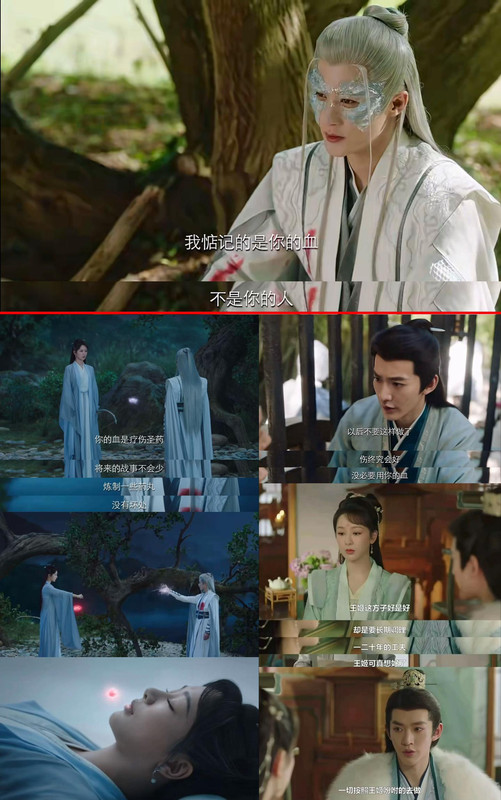 What is it that they are really thinking about? Only each of them knows in their own heart.
What is it that they are really thinking about? Only each of them knows in their own heart.
Xiaoyao is quite a complex character, and we are often misled by some of her actions. Let’s take an example: Tushan Jing’s leg could actually be healed. Xiaoyao tried to persuade him, but he said, “Just leave it, you don’t mind anyway.” Many people thought Xiaoyao’s behavior here was odd. But from Xiaoyao’s perspective, since she had to help her brother win over Tushan Jing, of course she needed to show goodwill, so she kissed him (the underlying meaning being: if it can't be healed, then so be it).
But with Xiangliu, at the great whirlpool, afraid that his injury might worsen, Xiaoyao pleaded with him, clung to him, even threw herself at him. Xiaoyao has always been the type who, if something doesn’t work, then so be it — she never forces it. Yet this time, she fussed and insisted with Xiangliu.
In fact, it is the same with us. If someone we care about has an injury that can be treated but chooses not to, we too would plead, even act willful, and would never simply say, “If it can’t be healed, then so be it.”
“I admit that the first time I watched it, I didn’t think too deeply either. Later, after reading the analysis, I realized I was truly blind. After Tushan Jing fell into the water and disappeared, Xiaoyao’s series of bold/clever actions were truly unprecedented and unmatched.”
- After being in the water for a full day and night, she got cramps and was brought back by Zhuanxu.
- From the spot where she fell into the water to the river mouth, they didn’t find the fox, and she was still thinking of going upstream to look (EXM?).
- I heard that the fox very likely rushed into the sea. When I watched it the first time, I immediately slapped my thigh and thought, “Isn’t that perfect? Isn’t it especially convenient for Yao to move in the sea?” But as I kept watching, I realized that Yao never actually had any intention of going into the sea.
- Later, when Yao shouted to the sea for Tushan Jing to come back, that part was still very moving. I even wondered if she might jump into the sea at any moment—but she didn’t…
- When she decided to hold a solo wedding, it was the action I found hardest to understand. (At first, I didn’t realize that her intention with marrying under the moon was to marry Xiangliu.) We’ve seen many weddings in romance dramas where someone goes through the ceremony alone. For example, the Demon Princess in Ashes of Love: usually in such cases, when it’s time for the ceremony and the groom still hasn’t appeared, common actions are:
Cancel the ceremony, standing alone in sorrow until dawn (Yao still performed the moon ceremony).
Bow to a memorial tablet or token (she didn’t do this either).
Perform the ceremony alone, then run to the groom’s family home (like Yiying did).
If she truly loved Tushan Jing, the normal thought process would be: perform the ceremony alone, then in her wedding attire rush to Qingqiu. But… nothing happened! Later, her grandfather and Zhuanxu even said, “Yao won’t be entered into the Qingqiu clan records, so this wedding doesn’t count.” So shouldn’t Yao have resisted and said, “Put my name in the records!”? Yet… nothing.
If she truly loved the fox, setting everything else aside, she should have gone straight to Qingqiu in her wedding dress. But I actually believe Yao didn’t have romantic feelings for the fox—she only offered companionship. What I find puzzling is: even if it’s just raising a dog or a servant, if it falls into the water and goes missing, shouldn’t you do everything you can to find it? Even if she feared others discovering her sea-monster-like body secret, she could have at least tried to sneak out to search in the sea (refer to the later part with the albatross demon; she secretly went to the East Sea—so she does have the ability to sneak out!). Yet she never did it even once.
This is what I find puzzling. She didn’t love Tushan Jing, and her feelings toward him were even rather indifferent. I also suspect that when Tushan Jing went missing, she didn’t truly want him to come back.
In Lost You Forever (长相思), why did Xiangliu return Tu Shan Jing only after seven years?
In Tong Hua’s drama, the Great Whirlpool was all given to the Castrated Fox, and Tu Shan Jing got beaten to death. In the book, did Tu Shan Jing have the ability to break the Jade Mountain Formation? He’s a useless person who can’t defeat anyone. Why would Xiangliu care about Tu Shan family matters? He would only act according to what Fangfeng Bei does, after all, he has to protect the Tu Shan family and his eldest son, Tu Shan Zhen. That “Jade Mountain” was Xiangliu in disguise. Don’t say Xiangliu can’t transform into Tu Shan Jing—if Xiangliu were that rigid, he would have died long ago. Zhiyi City was Xiangliu disguised as Tu Shan Jing. Tu Shan Jing reminded Xiaoyao that being captured and sent back to Gaoxin was a betrayal by the fox. When has Tu Shan Jing ever used a false face? He’d rather run around than change his face. Xiaoyao said she waits for him every full moon night. What does the full moon have to do with Tu Shan Jing? Xiaoyao’s divine skill allows her to recognize Xiangliu no matter how he transforms. Xiangliu came back to deliver a road carriage to his wife—a Tu Shan Jing puppet (didn’t Tu Shan Hou leave two tails for Tu Shan Jing?). Otherwise, Cangxuan wouldn’t have let go no matter what. In the book, the majority of Hongjiang and the righteous army didn’t die; only Xiangliu and a thousand death soldiers participated in the battle. Why must Xiangliu die? Didn’t the heroine, after feeling depressed for a few days, finally realize and go to the island with the elixirs sponsored by family and friends to save her husband? Xiangliu just lost his disguise. Let me emphasize: Xiangliu’s blood is red, not black. The Yellow Emperor evaluated that Cangxuan had a bit more mercy than him—there’s no reason to deny his sister’s only request. Otherwise, where is the mercy? Sending the sea demon back to the ocean is clearly letting them off. Tu Shan Jing had long been truly dead.
Today I took a look at episode 17, when Tushan Jing fell into the water—he was wearing tall boots. Then in episode 22, when Tushan Jing described how he was swept into a huge whirlpool and escaped, the shoes he was wearing turned out to be exactly the same as the ones Xiangliu wore in season one when he was up in the tree drinking blood! This filming technique! Xiangliu really borrowed Tushan Jing’s body to come to Xiaoyao’s side.
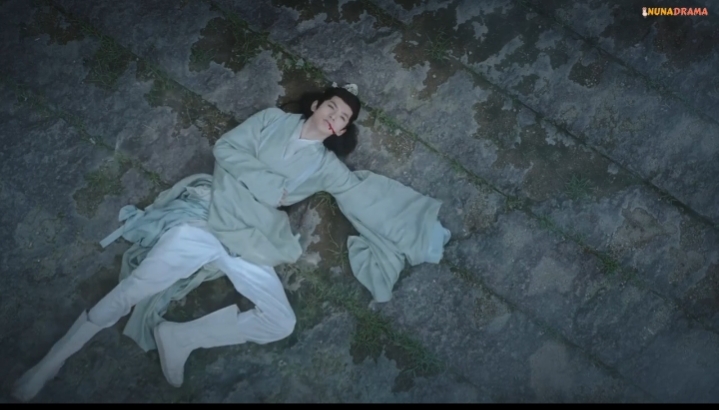
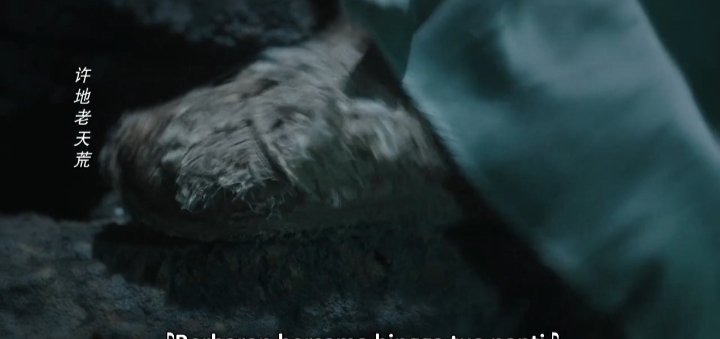
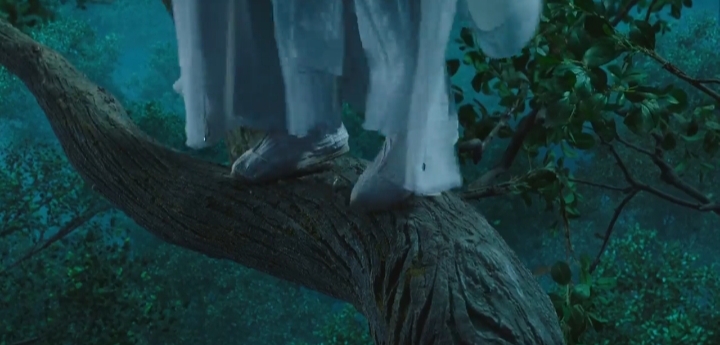
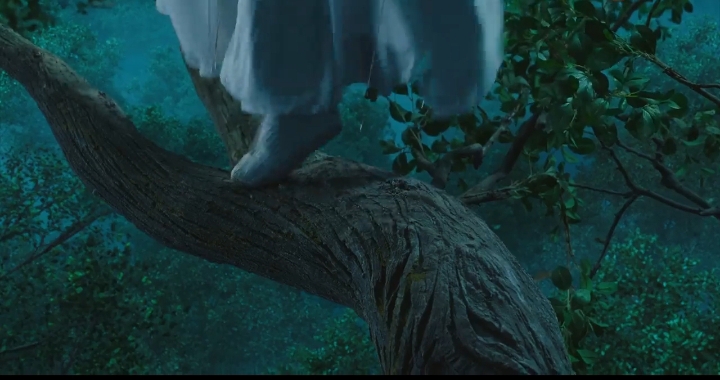
Recent Discussions
-
78 Episodes with English Subs19 minutes ago - LordFengCui
-
Fated Hearts (excerpt from the Chen Zheyuan ongoing Profile)27 minutes ago - Mizuhira-san
-
Last Drama You Completed? #240 minutes ago - Merce
-
Official Airing Schedule & Episode Calendar1 hour ago - Mizuhira-san
-
review section notification issue2 hours ago - ASTER
-
Twelve Letters Full OST with ENG SUBS + LYRICS2 hours ago - theshammykay
-
Last watched documentary series or movie?2 hours ago - Alexander
Hottest Discussions
-
Last Drama You Completed? #240 minutes ago
-
10 dramas/movies with ____? #46 hours ago
-
Word Association #45 hours ago
-
♥️Counting game♥️5 hours ago
-
Keep a word, drop a word #21 hour ago
-
Change 1 letter to make a new word #21 hour ago



